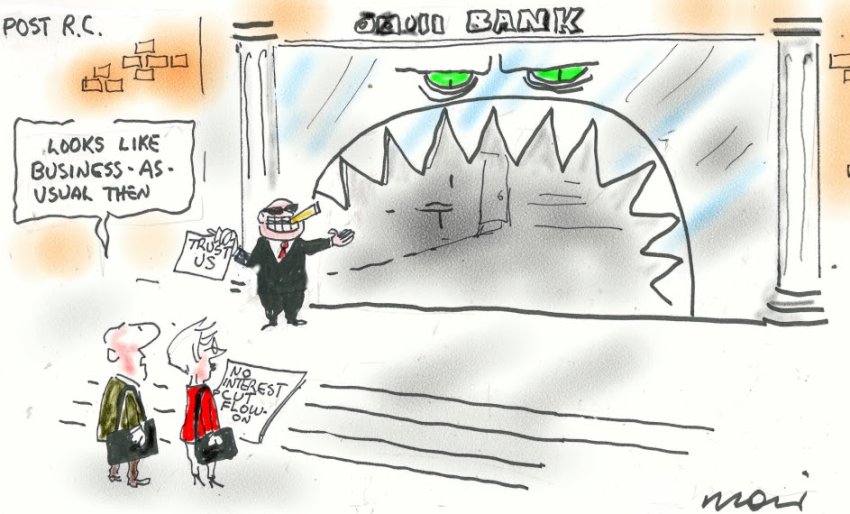
Federal Treasurer Josh Frydenberg's announcement of yet another inquiry into the banking sector is just the latest attempt by the Coalition government to pretend it is doing something about the crimes of the Big Four banks.
On October 14, the Frydenberg directed the Australian Competition and Consumer Commission (ACCC) to launch an investigation into the pricing of residential mortgages, after the banks yet again failed to pass on the full interest rate cut of 0.25 basis points ordered by the Reserve Bank.
The Big Four banks — ANZ, Commonwealth, NAB and Westpac, which control about 80% of Australia's $2 trillion home loan market — along with several other lenders have refused to fully pass on the three interest rates cuts totalling 0.75% that the Reserve Bank has announced this year.
Instead, banks have only reduced their rates by 0.57% — in the process grabbed about $570 million more in profits than if they had passed the full rate cuts onto borrowers.
Frydenberg's announcement takes the number of inquiries ordered or endorsed by the government to 72 in just the past 12 months.
This is the same Coalition government that stubbornly refused to support a royal commission into the banks for years, until it was finally forced to accept one in December 2017. The public is still waiting for substantial results to flow from the damning findings of the commission.
The royal commission, led by Commissioner Kenneth Hayne, released 76 recommendations for reforms to the banking system, together with 24 referrals for investigations into potentially criminal conduct, in February.
However, very few of those recommendations have been acted on and there are few signs of criminal charges being laid against bank executives.
The ACCC's most recent report on residential mortgage pricing, published late last year, was critical of the Big Banks' lending practices.
Among its eight findings were that mortgage pricing is "opaque", thereby suppressing "borrower incentives to shop around”. It also found banks lacked incentives to make prices more transparent.
The opacity has resulted in existing borrowers paying interest rates that are on average 32 basis points higher compared to new borrowers — a "loyalty tax" that delivers the Big Four almost $4 billion in additional profits each year.
Despite calls from the government and elsewhere for "greater competition" in the banking industry, it is clear that a market-based, privatised banking sector is, by nature, only interested in maximising profits.
Serious steps need to be taken towards recreating a public banking system — which existed in Australia until it was destroyed in the 1990s through the privatisation of the Commonwealth Bank.
A good start would be the establishment of a People's Bank, as The Greens have proposed.
New Zealand established the government-owned Kiwibank as a subsidiary of the NZ Post Office in 2002. It offers basic financial services, with lower fees and better services than private banks.
According to Socialist Alliance national co-convenor Susan Price: "Making the banking industry democratic and transparent is the only hope we have of tackling the problem — which is the private ownership of the financial institutions that control our wealth.
"A publicly-owned banking sector, under the direction of a board of elected delegates and community representatives, would make decisions in the interests of the community.
"With housing becoming increasingly unaffordable for many, the banks need to be forced to adopt a socially responsible loan policy for first home-buyers and small businesses, including farmers.
"A substantial government-owned bank could also assist with extending public ownership to other sections of the banking and financial services industry," Price said.